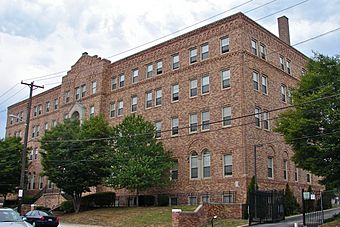St. Joseph's House for Homeless Industrious Boys facts for kids
Quick facts for kids |
|
|
St. Joseph's House for Homeless Industrious Boys
|
|

St. Joseph's House for Homeless Industrious Boys, September, 2010
|
|
| Location | 1511 and 1515--1527 Allegheny Rd., Philadelphia, Pennsylvania |
|---|---|
| Area | 1.3 acres (0.53 ha) |
| Built | 1929 |
| Architect | Hoffman-Henon; Getz, Peter, et al. |
| Architectural style | Romanesque, Italianate, Tudor Revival |
| NRHP reference No. | 96001204 |
| Added to NRHP | October 24, 1996 |
The St. Joseph's House for Homeless Industrious Boys is a special old building in Philadelphia, Pennsylvania. It is located at 1511 and 1515-1527 West Allegheny Avenue, in the Nicetown-Tioga neighborhood. This building was created to help young boys who needed a safe place to live and learn. It was a charity building, meaning it was supported by donations to help others.
Contents
A Home for Young Boys
This building was designed to be a home for boys who were homeless but also "industrious." This means they were willing to work hard. The idea was to give these boys a safe place to stay. They could also learn important skills to help them find jobs and build a better future. It was a place where they could get a fresh start.
Building Design and Style
The St. Joseph's House was built in 1929. It was designed by a famous architectural company from Philadelphia called Hoffman-Henon. The building has a mix of interesting architectural styles. These include Romanesque, Italianate, and Tudor Revival. Each of these styles adds unique details to the building's look.
What Do These Styles Mean?
- Romanesque style often uses round arches and strong, thick walls. It makes buildings look very solid.
- Italianate style often has tall, narrow windows and decorative brackets under the roof. It often looks like Italian villas.
- Tudor Revival style often uses steep roofs, decorative half-timbering (wood frames), and tall, narrow windows. It looks like old English homes.
These different styles make the St. Joseph's House a unique and interesting building to look at.
A Historic Landmark
On October 24, 1996, the St. Joseph's House was added to the National Register of Historic Places. This is a special list of buildings, sites, and objects that are important in American history. When a building is on this list, it means it is recognized for its historical value. It also helps to protect it for future generations.
The building covers about 1.3 acres of land. It continues to be an important part of the Nicetown-Tioga neighborhood's history. It reminds us of efforts to help young people in need.




